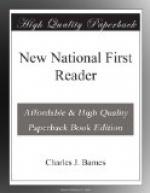Title: New National First Reader
Author: Charles J. Barnes, et al.
Release Date: October 25, 2004 [EBook #13853]
Language: English
Character set encoding: ASCII
*** Start of this project gutenberg EBOOK new National first Reader ***
Produced by Susan Skinner, the PG Online Distributed
Proofreading
Team, and The Internet Archive Children’s Library,
[Transcriber’s Note: The original text used accented characters to indicate pronunciation. This 7 bit version has been produced using the following markup scheme.
The accented character and the symbol representing the accent are surrounded with square brackets. If the symbol is placed in front of the character, the accent goes above the character. If the symbol is placed after the character, the accent goes below the character. If there is more than one character inside the brackets, the accent applies to all of them.
Accent Symbol acute / macron = breve ) diaresis : tilde ~ dot . cedilla 5 circumflex ^ up tack ± backslash \ th ligature [t-h] horizontal strikethrough — ]
* * * * *
BARNES’S NEW NATIONAL READERS
* * * * *
NEW NATIONAL FIRST READER
By
Charles J. Barnes
Harlan H. Ballard
S. Proctor Thayer
New York—Cincinnati—Chicago
American book company
1888, by A.S. Barnes & Co.
* * * * *
[Illustration: Preface]
The authors of this book believe,—
1st.—That the Word Method is the most natural and practicable, because words are representatives of objects, actions, etc., while letters, or sounds, in the abstract, convey no meaning to the pupil, and are devoid of interest.
2d.—That words of ordinary length are as easily learned as short ones, provided they are familiar to the pupil. No teacher will doubt the statement that a pupil will learn the word “mamma’” as easily as “says” or “eyes.”
3d.—That frequent “Reviews” are essential to the rapid and thorough advancement of pupils. By this means the words imperfectly learned are again brought to their attention and thoroughly memorized. That these “Reviews” ought to take up the new words in a different order and arrangement, in order to test the ability of the pupil to recognize them in any situation. That as soon as the vocabulary is large enough they should be written in the form of a new exercise, as on pp. 36, 44, 52,




